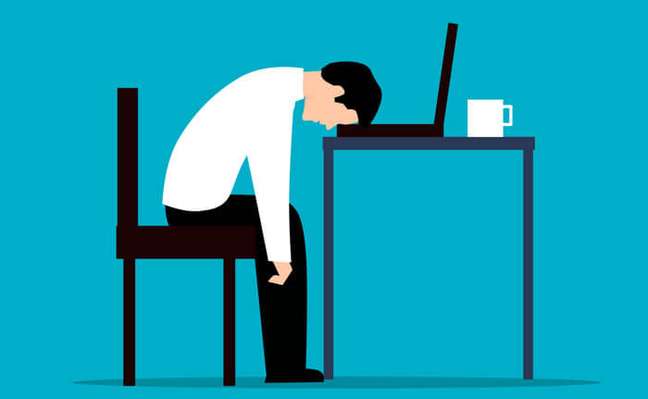Only when we understand that we are human beings – and not human resources – will we be able to heal mental health at work.

The widespread complaint is not recent: the book The Tiredness Society, by South Korean philosopher Byung-Chul Han, published in 2018, already spoke of the appreciation that organizations promote towards hyperactivity, multiple tasks and excessive speed, as responsible of collective exhaustion. “But the Covid-19 pandemic was the turning point of a stress epidemic, which also counts with social inequality, the economic crisis, technological innovation and workforce automation as triggers of this sentiment”, summarizes Rita Passos, president of the Brazilian Association for the Quality of Life (ABQV).
And since it is not possible to dissociate work from personal and social life, the crisis belongs to everyone. The diagnosis is made by the doctor, psychoanalyst and mental health consultant in companies André Fusco, based on the concepts of Christophe Dejours, a French psychiatrist who has thoroughly studied the influence of work on people’s lives: “Dejours warned of the centrality of work, which is precisely the impact he and his relationships have on society in general. Therefore, I argue that the great technology that will change the mental health of workers is the one directly linked to the operating system, that is, the one that reformulates the rules of work itself ”, underlines Fusco.
immediate measures
Until then, we will only deal with the superficiality of the problem and use technology to try to find ways to alleviate what we feel. “New ways emerge every day to access help, track progress and increase our understanding of workers’ mental well-being. Today, there are apps that help the user connect with a healthcare provider, improve memory, relax, meditate or sleep better, or that use artificial intelligence to predict a change in behavior and provide a signal that it is. before the crisis ”, lists Rita.
However, in the face of this explosion of alternatives, the search for scientific evidence on what actually works can never be abandoned, as the president of ABQV makes clear: “There is still no clear regulation for the mental health market, nor standards that help the consumer to evaluate if an app is really effective for what it proposes. And frustration with the initial expectation has meant that many platforms have high initial engagement but an equally high dropout rate. ”
In any case, it is undeniable that technology has opened a new frontier in mental health support and data collection. “It has proved essential to facilitate access to aid and multiply the resources of telemedicine and telepsychology, especially during the pandemic,” he sums up.
For André Fusco, before adopting any of these solutions as the only strategy, it is necessary to remember that, in mental health, the problem is not with the patient. “We need to stop talking only about depression, work-life balance, yoga, meditation and sleep quality because with that we are only discussing how employees should act, not what organizations need to change.”
Being human or being a resource
André Fusco guarantees that much of the illness at work today derives from the conflict between the human being and being a human resource.
It is that the human being, in the face of suffering, creates beliefs and values to make sense of what he is experiencing. “So a doctor on duty blindly believes that, to be a good professional, it is necessary to be without sleep for 36 hours, since this trait suffered at work has become a value and, without it, it would be very difficult to endure the lack of rest” , sums up Fusco. Humanity, that is our basic need for sleep, becomes shameful and therefore needs to be hidden.
There are many other beliefs and values that permeate business relationships. Putting your career first is one of them. For women, the maternity break can be understood as disadvantageous and, therefore, those who reduce the time of the leave show the act as a good example to follow.
New mothers returning to work need organizations that put their mental health at the center. From a study on maternity leave conducted by the Fundação Getúlio Vargas it emerged that, two years after the expulsion, almost half of women are out of the labor market, either by their own choice or by the company, precisely because they do not have it. does. For researchers, just the four-month leave does not provide the necessary support for these professionals, who need other organizational policies, such as daycare and flexible working hours, to return to work without suffering mental health damage.
Fusco shares this impression of FGV scholars and reiterates that there are still a large number of women who maintain the belief that they are spoiled and / or bad simply because they cannot be good mothers and good professionals at the same time: “It took me two years to be able to implement a policy of gradual return to work after maternity leave in a company to which I provide advice. The initial idea was for these women to return to the office initially part-time and not have variable pay on goals in the first few months, so they could adjust to the new routine. And do you know who was against these measures? The same women, who did not want to occupy a ‘café au lait’ position, in which the suffering they felt just because they were new mothers was evident ”.
Incentive and evaluation models
We are used to working in exchange for variable pay, calculated from an employee efficiency ranking. Whoever does more gets more. And if a person wants to be paid more, he has to work harder. “This is how current employment relationships are shaped, still based on Fordism, a model that aims only to increase productivity by reducing costs,” says Fusco.
The problem with this model of meritocracy is that human beings are not comparable, since each has a value in itself. So why does this happen at work and we all agree that this is the case? “Meritocracy is a structural belief that still exists in organizations and it must be questioned with a really critical look so that people do not continue to get sick of the mind, as it is happening”, provokes the psychoanalyst, who continues: “Without this, we will continue, as a society, to blame the victims ”.
“Talking about balance between personal and professional life presupposes that the staff are always good and professional, always bad; but the work must also be good. Both work and personal life generate suffering, but the point is that at work, suffering has no meaning and, therefore, it does not generate growth, it does not generate value for anyone, it is only supported to the point of generating disease ”, says André Fusco.
And the future, what will it be like?
Some reflections on the ways to follow:
• Companies exist to add value to society, not just to generate profit: In this perspective, professionals must receive stimuli according to a new logic of work, in which there is a well-understood purpose and, therefore, producing more can be interesting for themselves and for society as a whole. .
• Ongoing and online mental health programs: Companies should consider offering their employees a model that includes multiple components and is integrated into the network offered by the health care plan for continuity of care. The use of online platforms and digital programs facilitates access and promotes mental health awareness, reducing stigma and encouraging self-care.
• The Great Resignations and Mass Resignations: “I don’t know how long I’ll last” is a recurring phrase in companies and the Great Dimissionation movement, with requests for resignations presented with great intensity by workers (especially in the USA), makes it clear the non-acceptance of obsolete work Models.
• Department of Human Beings: Inclusive work teams and leaders who encourage (and shape) work-life balance make employees psychologically more confident in expressing ideas and opinions. This often has a greater effect on maintaining mental health than therapy sessions or relaxation and meditation apps.
Such concepts and questions are already taking shape among professionals, leaders and recruiters, tend to gain more and more strength, and should determine how mental health at work will be addressed in the next decade.
After a period of pandemic in which the issue took on an air of urgency – and was treated as such, with the “painkillers” we had at hand – the field is open for the debate to reach deeper layers. In them, issues such as the personal value of work, the social value of work, professional fulfillment, purpose and emotional well-being are key elements, which can lead the company to ask, sincerely, “the goals and metrics forged in the industry Do we still need the revolution? “
Renata Armas is a writer forUnbox project
.
Source: Terra
Benjamin Smith is a fashion journalist and author at Gossipify, known for his coverage of the latest fashion trends and industry insights. He writes about clothing, shoes, accessories, and runway shows, providing in-depth analysis and unique perspectives. He’s respected for his ability to spot emerging designers and trends, and for providing practical fashion advice to readers.








